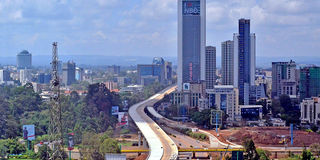Roads for Prosperity: How Kenya is weaving an elaborate network of highways, bypasses, avenues and rural streets
Sponsored content

A section of an elevated expressway in Nairobi metropolis.
By Evans Ongwae
Expanding, maintaining and preserving the country’s road network is critical in the drive for sustainable development. Well-developed, adequately maintained roads contribute to economic development and growth.
During a recent inspection of road projects, Transport Cabinet Secretary (CS) James Macharia said the current government had tarmacked more than 10,500km of roads since 2013, surpassing the pledge it had made when assuming power.
The CS added that many other roads across the country were under construction. The Jubilee administration aims to have tarmacked more than 11,000km of roads by the end of its term in August this year, Macharia pointed out.
“The current administration is keen to ensure there is an elaborate and upgraded road network in the country, as the infrastructure will boost economic activities,” said the CS.
When the three national road agencies complete ongoing projects, the country will have added 17,000km of roads to the national stock. KeNHA is working on 1,501.2km; KeRRA on 4,605.4km and; KURA on 582.2km.
More roads, totalling 6,395.32km, are planned.
Roads open up more areas to investments and stimulate economic and social development. Many areas with modern road networks have seen the value of land increase manifold in recent years. Some plots that people bought for Ksh50,000 less than two decades ago have appreciated in value to more than Ksh5 million today.
Roads link farmers to markets, workers to jobs, students to school, and patients to hospitals. Simply, roads are vital to the country’s development agenda. For instance, roads have been identified as enablers of the Big-4 Agenda, which entail boosting manufacturing, improving food security and nutrition, increasing affordable housing and attaining universal health coverage.
Undoubtedly, the economy needs adequate, efficient infrastructure that reliably connects supply chains and efficiently moves goods and services within the country and across borders.
A good road network, for example, enables a student who lives in Joska (in Machakos County) to commute daily to a university located on the Thika Superhighway. If that student studies at the Jomo Kenyatta University of Agriculture and Technology (JKUAT), he or she will have crossed Nairobi County and Kiambu County, thus travelling through three counties. Even if that student goes only as far as Kenyatta University, he or she will have seamlessly traversed through two counties and arrived at the border of a third.
This kind of road network enables a Nyandarua farmer to transport cabbages and potatoes through Nakuru and Kiambu counties, all the way to Nairobi County.
Roads are a route to prosperity for all people. They must be maintained to continue offering the same service in the future. Keeping roads in good shape also contributes to reducing accidents.
Roads should be maintained well throughout, and new ones built to open up more parts of the country in support of the national development agenda.
Click here for detailed accounts by government agencies on what they are doing towards improving Kenya's roads network.


